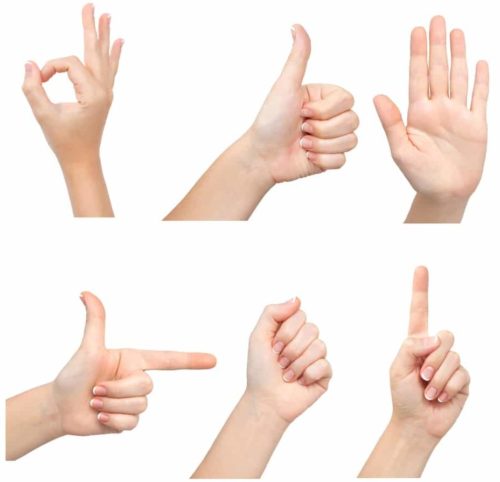
For this experiment I recruited the help from my sister. After explaining that we couldn't use any symbolic languages which included not just speaking or talking but ASL as well which we both know (her a lot more than I). We then started on the journey of trying to communicate. I think I was more in charge of the conversation at first as I tried to explain some up coming plans I have for next week or trying to show her a show I was watching. Both were pretty hard to do as we tried not to use any symbolic languages. As I tried to explain using somewhat vague body movements we struggled with the conversation. After the time was up we then went back and explained what we were trying to say which was pretty funny in itself.
As far as different cultures with one that can convoy symbolic language compared to one that can't I do believe it is easier to express language that may be more complex. I think the culture that can use more complex languages can help convey more ideas to their population at lest much quicker than a culture that cannot.

We then shifted into the second portion of the experiment. Now I know most people use their hands and facial expressions to help convey what they say. For the second part of this experiment my sister and I tried to talk to one another with as motion as possible with no body or hand motions and it was also a pretty interesting result. Even though it was easier to communicate ideas and thoughts as well as just talking. It was more difficult to explain things. It was also a little bit harder to stay in character. Looking back I think signs like hand motions, and body motions help us explain whats being said. Different cultures have different symbols or movements when talking to others. I believe reading body language is very important to know as it can help you understand who you are dealing with. Some people may talk with their body motions more than others. Body motions can also help when someone is trying to talk to you and you both have limited knowledge of the other persons language so with that language barrier their could be more gestures put in.

Common hand signals in America
I think there is a certain time when body signals can be deceiving. I believe that when someone is being deceptive their body language can shift giving the reader bad information.
 As we see here this innocent looking creature may not be a goldfish at all.
As we see here this innocent looking creature may not be a goldfish at all.
In closing even though both of these experiments were some what short they have shown me how important it is to understand one another. Being able to express feelings, ideas, or commands to one another has helped pushed not just our society but our species forward to where we are today and well into the future.
 Another set of hand and body gestures known in the United States and possibly even the world.
Another set of hand and body gestures known in the United States and possibly even the world.
(I think you all know)
-Sean
(And yes its possible to paddle board with a kayak paddle..... I just would not recommend it)
ReplyDeleteHello Sean,
I really like your post! I'm a visual learner so when I see picures it intrigues me to read it. I also can't imagine going kayaking without speaking. It was really fustrating for me to describe things in this experiement. I agree on part two on how you said it was hard to stay in character. It was really uncomfortable in my opinion Yes,I agree that diffrent cultures have different symbols and movements. I really liked how you presented this assignment but still followed the rubric in essay form. Well done!
Laura
Part 1:
ReplyDelete"we couldn't use any symbolic languages which included not just speaking or talking but ASL"
But SHE could. Only you were supposed to be limited in your communication. Sounds like both of you were limited and this will severely limit your results. The idea here was to create a power differential between you (no symbolic language) and your parter (symbolic language) and see how that impacted power and control in the conversation.
"I think I was more in charge of the conversation "
Okay, but you shouldn't have been. Your sister should have been able to use symbolic language to control the conversation.
I agree with your conclusion regarding the symbolic vs. the non-symbolic culture. But what would the attitude of the speaking be to the non-speaking? And missing the real-life example requested in the last part of the prompt.
Part 2: Again, you were the only one who should have had limited speech. Your partner should have been focusing on what it was like to communicate with you as you refrained from using body language. Instead, she was focusing on stopping herself from using body language.
I see where you discuss the information communicated with body language, but you are only considering the situation where body language matches and supports the information you receive from spoken language. What does it tell you when the body language doesn't match the spoken language? Humans tend to use body language as a type of lie detector. If spoken words don't match with the body language, we are more inclined to believe the body language and doubt the words. Think about how being able to detect liars might help an individual's ability to survive and reproduce (which applies to the next section).
Missing the section on the benefits of being able to read body language? In particular, what type of benefits do you get by being able to detect liars?
Missing a response to the question asking you to identify individuals who have trouble reading body language. There are groups of people who have great difficulty or an outright inability to read body language due to physical or mental disability, such as those who are in the autism spectrum or those who are blind (though they can read vocal intonation).
"I believe that when someone is being deceptive their body language can shift giving the reader bad information. "
Actually, body language is what is likely to reveal the lie (see discussion above). Any poker player knows that if a person is trying to bluff (lie), there will usually be a "tell" from the body language to indicate that bluff. Body language is very difficult to fake.
But is there any situation you can think of where body language might actually mislead you, not because the person is lying but because you don't know how to read the body language? Do all cultures use the same system of body language? They all use different systems of spoken/written language, so why would we assume their body language isn't different? If you travel to another country, can you trust the information you get from their body language?
Hello Dense Rescue,
ReplyDeleteI read your post and thought it was quite interesting. There is a lot to what a person’s body language can express as well as tone within the voice of that individual. Though it is possible for a person to deceive another with false body language, it is quite the hard skill to perform for most people. The body language is usually what tells the truth on what a person’s standpoint or what their true thoughts are. It can also tell you what moods they are in. The various ways that the body shows signs is simply difficult to change based on what one wants the other to see (body deception) and majority of the time tells the truth as it is natural. There are certain situations where body language is not a viable source to read for those who can be medically impaired may not be able to show body language or show difficulty in being read. Most people can’t really tell when I am excited about something as I may not show it in my body language or due to the tone of my voice being flat. This has been an issue at times as I may be read to not be interested or not be paying attention while being the complete opposite.